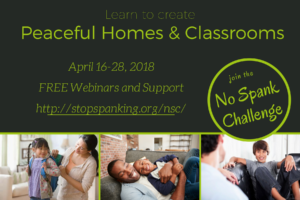There’s Something We CAN Do!
 On March 14th, when tens of thousands of students across America walked out in protest of the national inaction to end school gun violence, Wylie Greer, a student at Greenbrier High in Arkansas did the same. In response, his principal punished him by hitting him with a board!
On March 14th, when tens of thousands of students across America walked out in protest of the national inaction to end school gun violence, Wylie Greer, a student at Greenbrier High in Arkansas did the same. In response, his principal punished him by hitting him with a board!
The #ItsTime movement has brought to national attention this insidious practice many of us are shocked to learn is still “a thing.” The irony that Wylie was hit in response to protesting school violence is mind bending. And yet, teachers regularly assault children in the name of discipline despite strong anti-bullying school policies. 160,000 schoolchildren are paddled annually, often for offences as minor as tardiness, failing a test, or sassing the teacher.
Wylie chose to be paddled rather than suspended in an effort to protest the hypocrisy of violent disciplinary policies. Later, Wylie says the principal told him “not all corporal punishment sessions end like that.” Wylie took this to mean, “he didn’t hit me as hard as he could have.” Of course, we know that some kids are hit much harder and more frequently. Many of these children sustain injuries ranging from large bruises on their legs and bottoms to broken teeth and bones from falling to the floor from the impact of the strike. Some children are hospitalized.
.
The typical reaction when people hear that schools still paddle kids is usually something like, “there’d be hell to pay if anyone ever laid a hand on my child!” Although we can all understand this response, it doesn’t really work that way, because corporal punishment in schools isn’t the idea of some crazy solo principal or a particularly irritable teacher. It is a policy that is supported by the school and a community of parents. That is why the practice, though obsolete for decades in some states, is still alive and well in others, particularly the rural South. What may seem like a barbaric practice to parents in say, Portland, Oregon is “par for the course” in Little Rock, Arkansas. Some parents do actually protest these policies by signing a form opting out of the practice. Despite this option, there are many cases where children are paddled anyway! In cases where parents believe in spanking, some object to the severity of the beating when their child comes home seriously injured. Unfortunately, legal recourse in these cases is historically dismal with consistent legal ruling in favor of schools.
.
Most battles with the school never reach litigation, because the social pressure that parents face in small rural communities is enormous. In smaller communities where everybody knows everybody, part of survival is getting along. Communities alienate families who take legal action. Alienation in small communities can be unbearable. Parents who have resources often remove their child from public school, but others might only be lucky enough to move to another district often with identical violent disciplinary practices. Parents who lack the resources to move elsewhere or have family ties to their community, helplessly just pray their child will not be struck again. It is so easy to say, “There’d be hell to pay” when we live in places where our community feels likewise, or where school paddling has been banned for decades. It is much harder to follow through on that sentiment when you are all alone.
.
When enough parents abandon spanking, schools abandon it as well. Research shows that community pressure is one of the top 5 indicators that a parent will spank their child. The others are having been spanked yourself, being under age 30, being poor, or having a toddler. So how can we reach these parents and help them feel less alone? How do we support a growing protest against school corporal punishment? Oftentimes, these parents don’t have the money for a date night, let alone for a parenting class.
..
There is something we can do!
.
We can create a larger community that supports parents who want to embrace non-violent discipline. That is what my colleague Amy Bryant and I, along with many other positive parenting advocates, have been doing for the past five years. We’ve created an online community and every April we sponsor a free online event called the NoSpankChallenge to help parents abandon spanking and yelling. We invite well-known parenting educators, researchers, and trauma-informed experts to offer live interactive webinars for any parent, anywhere who needs support.
.
So, whether you live in Oregon, Arkansas, or New York City, whether you live in a city or a small town – you belong. You belong to a bigger community that supports you as a parent to parent peacefully.
.
Please join us this April and spread the word, because #ItsTime to #StopSpanking!

Robbyn Peters Bennett, LPC
Founder, StopSpanking.org is a grandmother, an advocate for children, and a psychotherapist who specializes in the treatment of mood problems and distress related to early abuse and neglect.
